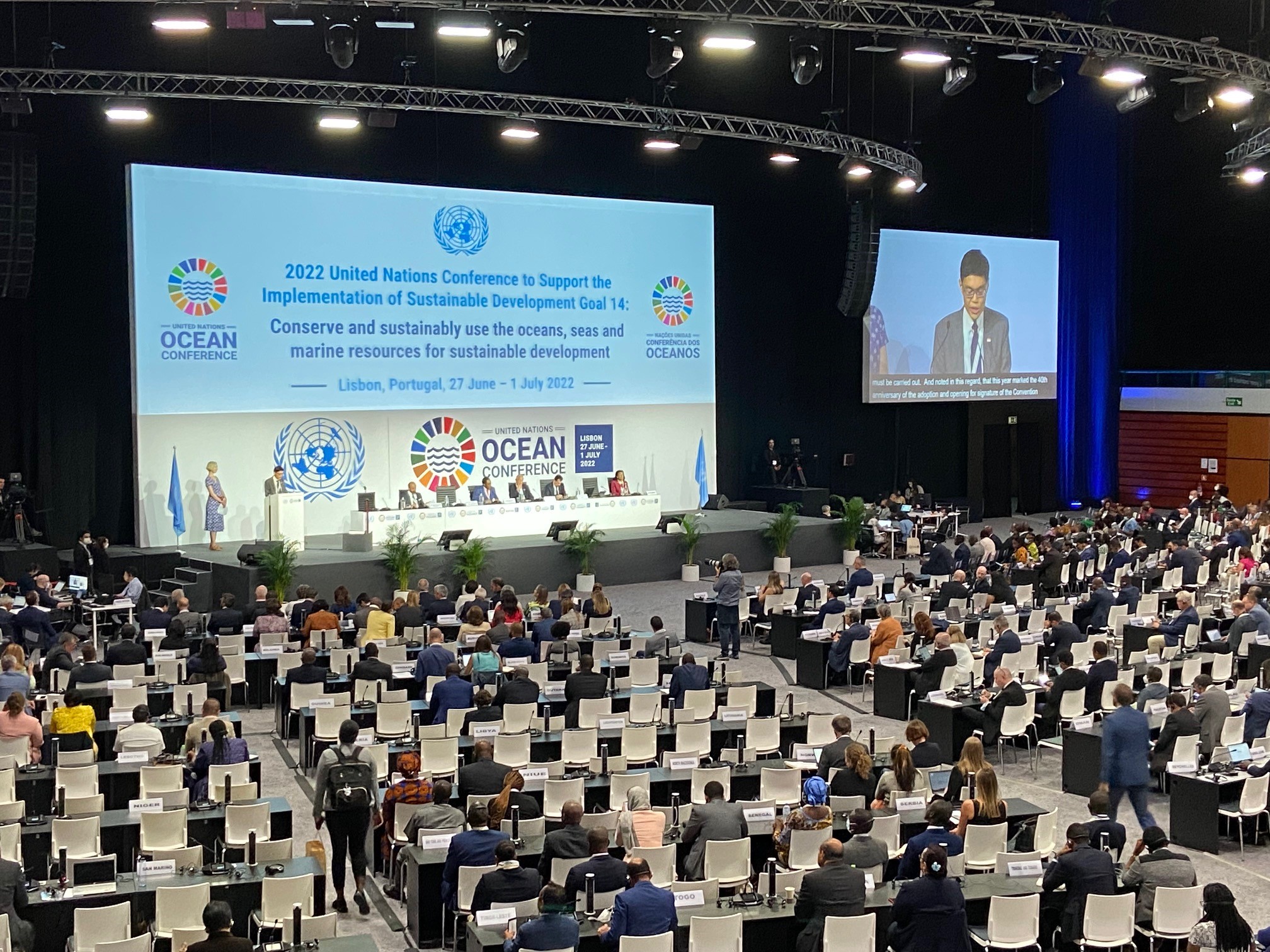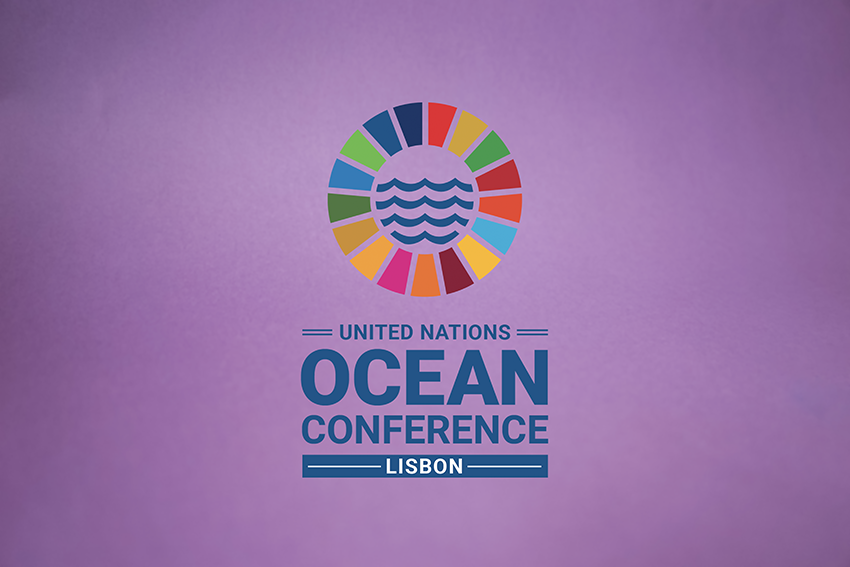One key message that was repeated along the conference and that is important that we all understand is the following:
We have failed collectively as world leaders, as civil society, as business wo/men, as researchers, as entrepreneurs, to take action agaist the deeply alarming global emergency the Ocean is facing.
The Conference left that clear and its recognition was important to make leaders renew their commitments to take urgent actions to achieve Ocean-related targets and to cooperate at all levels. With coastal erosion, rising sea levels, warmer and more acidic waters, marine pollution, overexploitation of fish stocks and decrease of marine biodiversity, the path is not easy as we need to urgently improve the health, productivity, sustainable use and resilience of the Ocean and its ecosystems. As Isabella Lövin, former Deputy Prime Minister of Sweden, called out on all governments: "Without political will we will not make it. We are the last generation that can do something about it, and you -referring to government representatives- are the ones who can make it happen. This is the most important talk we can be having".

Photo: UN DESA / Helen Daun Rosengren
So what are the results of the UN Ocean Conference?
After a five-day event with more than 6,000 participants from more than 150 countries including 24 Heads of State and Government, and over 2,000 representatives of civil society, a collective agreement to scale up science-based and innovative actions to address the ocean emergency was reached. This political declaration was accompanied by close to 700 new commitments made by many countries and stakeholders from all sectors of society — youth, civil society, businesses, and the scientific community — demonstrating the willingness to transition towards a sustainable ocean economy and, as a result, improve biodiversity, community livelihoods, and climate resilience.
Here below a 59-second stop motion snapshot of how it looked for Geonardo attending the conference:
The urgency to act
Time is running out. According to Peter Thompson, Special UN Envoy for the Ocean:
"We have about 8 years to revert the unacceptable future our grandkids will live in: with fires and famine, war and natural disasters. It's time those with money partner up with those who don't have it and act to make the implementation of solutions possible".
Why 8 years? Because the tipping point is expected to be reached in 2030. This being the reason why in this conference more than 100 Member States committed to conserve or protect at least 30 percent of the global ocean within Marine Protected Areas and other effective area-based conservation measures by 2030.
As the most admired person at the UN Ocean Conference and the most respected persona in the world's Ocean community, Dr. Sylvia Earle, called on all participants:
We are on a course of decline, we can see it and we can measure it. But it doesn't have to be that way. We don't have to reach tipping points that take us to catastrophic events. We can instead reach turning points. Humans have succeeded in developing the most magnificent ways of destroying the planet -and one another. We are so good at killing -and at killing nature! We got evidence everywhere of how we have consumed the natural world and it has paid off our prosperity. But it has come at a cost that we are just beginning to recognize and account for that cost.
So what do we have to do now? To give back to the Ocean, what it has given us: life. Consider you impact on nature, everybody has an impact! AND EVERYBODY HAS POWER. This is the time, CRITICAL TIME, as never before to take action. Never again we'll get the best chance ever to find a place within the natural systems to keep us alive.
Some actions came already from the conference, shortlisting here below the snapshot the UN put together per areas:
- Investments
- The Protecting Our Planet Challenge will invest at least USD 1 billion to support the creation, expansion and management of marine protected area and Indigenous and locally governed marine and coastal areas by 2030.
- The European Investment Bank will extend an additional EUR 150 million across the Caribbean Region as part of the Clean Oceans Initiative to improve climate resilience, water management and solid waste management.
- The Global Environment Facility approved a $25 million grant towards Colombia’s marine protected areas.
- The Development Bank of Latin America announced a voluntary commitment of USD 1.2 billion to support projects to benefit the ocean in the region.
- Ocean Risk and Resilience Action Alliance announced a multimillion-dollar global search for the next generation of projects to build resilience of coastal communities and finance through finance and insurance products.
- Marine Protected Areas and Pollution
- Portugal committed to ensure that 100% of the marine area under Portuguese sovereignty or jurisdiction is assessed as being in Good Environmental State and classify 30% of the national marine areas by 2030.
- Kenya is currently developing a national blue economy strategic plan, inclusive and multistakeholder-oriented. Kenya also committed to developing a national action plan on sea-based marine plastic litter.
- India committed to a Coastal Clean Seas Campaign and will work toward a ban on single-use plastics, beginning with plastic bags.
- Science and Innovation
- Sweden will support enhanced scientific cooperation, including by providing USD 400,000 in 2022 to IOC UNESCO for the UN Decade of Ocean Science for Sustainable Development in support of work on SDG 14 target 3.
- The Alliance of Small Island Developing States launched the Declaration for the Enhancement of Marine Scientific Knowledge, Research Capacity and Transfer of Marine Technology to Small Island Developing States.
- Climate Action
- USA and Norway announced a Green Shipping Challenge for COP 27.
- Singapore is also championing green shipping, encouraging carbon accounting by shipping companies, and research on low-carbon maritime fuels.
- Chile is working with specialized centers to develop a network of green corridors for maritime transport in order to achieve zero carbon shipping.
Is this enough?
Well, NO. Here is why
- WE NEED MONEY: according to Karen Sack, the Executive Director for the Ocean Risk and Resillience Action Alliance, "less than 0.01% of the total budget spent on achieving the Sustainable Development Goals, is spent on Goal 14: Life Below the Water".
- WE NEED A MENTALITY CHANGE: Quoting Tobias Troll, Marine Policy Director with Seas At Risk, "We must stop the mentality of exploitation" and instead RISE UP:
- R - Restore Ocean Life
- I - Invest immediately in a net-zero carbon emission future
- S - Speed up the transition to a circular economy
- E - Empower and support coastal communities
- U - Unite for stronger global ocean governance
- P- Protect at least 30% of the Ocean by 2030.
- WE NEED POLITICAL WILL: From 15-26 August, 2022, the 5th and final round of talks negotiating session for a high seas treaty for biodiversity in areas beyond national jurisdiction (BBNJ) is taking place and political will is needed to put conservation first. As Lisa Speer from the Natural Resources Defense Council from the US said:
"The most single thing we can do for the Ocean is curving carbon emissions. The other main thing we can do is protect and restore biodiversity".
And to finish with one more quote from a Norwegian delegate: The Ocean is, in one word, our solution for the future.
